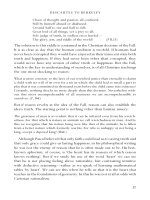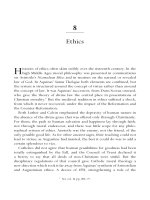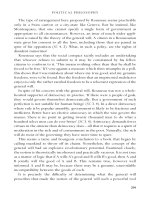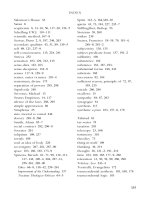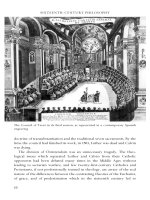The rise of modern philosophy a new history of western philosophy volume 3 (new history of western philosophy) ( PDFDrive ) (1) 216
Bạn đang xem bản rút gọn của tài liệu. Xem và tải ngay bản đầy đủ của tài liệu tại đây (23.12 KB, 1 trang )
METAPHYSICS
the substances we encounter are chunks of matter, matter in this case with
the form of cattishness. Prime matter, matter devoid of any form, is indeed
not perceptible by any sense; but that is because there is no such thing in
reality; prime matter is a philosophical abstraction for the purpose of the
analysis of substantial change.4
It cannot, of course, be taken for granted that the Aristotelian account
of substance and matter can be reconciled with, or adapted to, the progress
made by seventeenth-century scientists in the analysis and explanation of
motion and change. The point I wish to make here is simply that the
traditional notion of substance is not disposed of by Berkeley’s demolition
of the quite diVerent, internally incoherent, notion propagated by Locke.
The criticism of matter is not in fact essential to the construction of
Berkeley’s idealism; it merely removes an obstacle to its acceptance. Matter
was fantasized in order to be the basis of our ideas. That role in Berkeley’s
system belongs not to matter but to God. The Wrst premiss of the argument to that conclusion is that human beings know nothing except ideas;
and that premiss is stated long before the onslaught on the notion of
material substance. The Wrst book of the Principles begins thus:
It is evident to any one who takes a survey of the objects of human knowledge, that they
are either ideas actually imprinted on the senses; or else such as are perceived by
attending to the passions and operations of the mind; or lastly ideas formed by help
of memory and imagination. (BPW, 61)
This is surely not evident at all. Use the word ‘idea’, if you wish, in such
a broad sense as to make it true that whenever I perceive, remember, or
think of X I have an idea of X, and that whenever I learn, believe, or know
that p I have a corresponding idea. It still does not follow that the objects of
all human knowledge are ideas. From the very broad nature of the
deWnition it follows that any cognitive act or state will involve my having
ideas; but that does not mean that every cognitive act or state is about
those ideas, or has those ideas as its object. If I see a giraVe, I will, given
this terminology, have an idea of a giraVe; but what I see is a giraVe, not an
idea. If I think of the larch at the end of my garden, I will, again, have
an idea of that tree; but what I am thinking about is the tree, not the idea.
To be sure, I can also think of that idea; for instance, I can think that it is a
pretty hazy one. But that is quite a diVerent thought, a thought about
4 See vol. I, p. 192.
201

